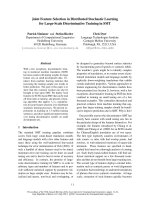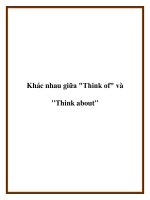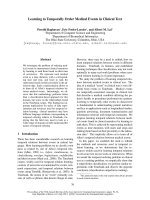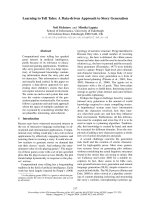DNykxIj4TLicpMSI dy4dg 678c43f1933349da98708aab5e6feb7f learning log template think about data in daily life
Bạn đang xem bản rút gọn của tài liệu. Xem và tải ngay bản đầy đủ của tài liệu tại đây (186.15 KB, 6 trang )
_____________________________________________________________________________________
Learning Log: Think about data in daily life
Instructions
You can use this document as a template for the learning log activity: Think about data in
daily life. Type your answers in this document, and save it on your computer or Google Drive.
We recommend that you save every learning log in one folder and include a date in the file
name to help you stay organized. Important information like course number, title, and activity
name are already included. After you finish your learning log entry, you can come back and
reread your responses later to understand how your opinions on different topics may have
changed throughout the courses.
To review detailed instructions on how to complete this activity, please return to Coursera:
Learning Log: Think about data in daily life.
Date:
Course/topic: Course 1: Foundations: Data, Data Everywhere
Everyday
data
Create a list of at least five questions:
Learning Log: Think about data in daily life
1.
2.
3.
4.
5.
Reflection:
Write 2-3 sentences (40-60 words) in response to each of the questions
below.
Questions
and
responses:
Now, select one of the five questions from your list to explore.
Selected question: Type your response here
● What are some considerations or preferences you want to keep in
mind when making a decision?
Type your response here
● What kind of information or data do you have access to that will
influence your decision?
Type your response here
● Are there any other things you might want to track associated
with this decision?
Type your response here
1
_____________________________________________________________________________________
Foundation
What you will learn:
Real-life roles and responsibilities of a junior data analyst
How businesses transform data into actionable insights
Spreadsheet basics
Database and query basics
Data visualization basics
Skill sets you will build:
Using data in everyday life
Thinking analytically
Applying tools from the data analytics toolkit
Showing trends and patterns with data visualizations
Ensuring your data analysis is fair
What you will learn:
How data analysts solve problems with data
The use of analytics for making data-driven decisions
Spreadsheet formulas and functions
Dashboard basics, including an introduction to Tableau
Data reporting basics
ASK
Skill sets you will build:
Asking SMART and effective questions
Structuring how you think
Summarizing data
Putting things into context
2
_____________________________________________________________________________________
Managing team and stakeholder expectations
Problem-solving and conflict-resolution
Prepare
What you will learn:
How data is generated
Features of different data types, fields, and values
Database structures
The function of metadata in data analytics
Structured Query Language (SQL) functions
Skill sets you will build:
Ensuring ethical data analysis practices
Addressing issues of bias and credibility
Accessing databases and importing data
Writing simple queries
Organizing and protecting data
Connecting with the data community (optional)
Process
What you will learn:
Data integrity and the importance of clean data
The tools and processes used by data analysts to clean data
Data-cleaning verification and reports
Statistics, hypothesis testing, and margin of error
Resume building and interpretation of job postings (optional)
Skill sets you will build:
Connecting business objectives to data analysis
Identifying clean and dirty data
3
_____________________________________________________________________________________
Cleaning small datasets using spreadsheet tools
Cleaning large datasets by writing SQL queries
Documenting data-cleaning processes
Analyze
What you will learn:
Steps data analysts take to organize data
How to combine data from multiple sources
Spreadsheet calculations and pivot tables
SQL calculations
Temporary tables
Data validation
Skill sets you will build:
Sorting data in spreadsheets and by writing SQL queries
Filtering data in spreadsheets and by writing SQL queries
Converting data
Formatting data
Substantiating data analysis processes
Seeking feedback and support from others during data analysis
Share
What you will learn:
Design thinking
How data analysts use visualizations to communicate about data
The benefits of Tableau for presenting data analysis findings
Data-driven storytelling
Dashboards and dashboard filters
Strategies for creating an effective data presentation
4
_____________________________________________________________________________________
Skill sets you will build:
Creating visualizations and dashboards in Tableau
Addressing accessibility issues when communicating about data
Understanding the purpose of different business communication tools
Telling a data-driven story
Presenting to others about data
Answering questions about data
Act
What you will learn:
Programming languages and environments
R packages
R functions, variables, data types, pipes, and vectors
R data frames
Bias and credibility in R
R visualization tools
R Markdown for documentation, creating structure, and emphasis
Skill sets you will build:
Coding in R
Writing functions in R
Accessing data in R
Cleaning data in R
Generating data visualizations in R
Reporting on data analysis to stakeholders
Capstone
5
_____________________________________________________________________________________
What you will learn:
How a data analytics portfolio distinguishes you from other candidates
Practical, real-world problem-solving
Strategies for extracting insights from data
Clear presentation of data findings
Motivation and ability to take initiative
Skill sets you will build:
Building a portfolio
Increasing your employability
Showcasing your data analytics knowledge, skill, and technical expertise
Sharing your work during an interview
Communicating your unique value proposition to a potential employer
6









